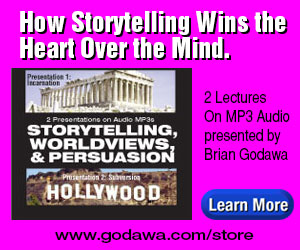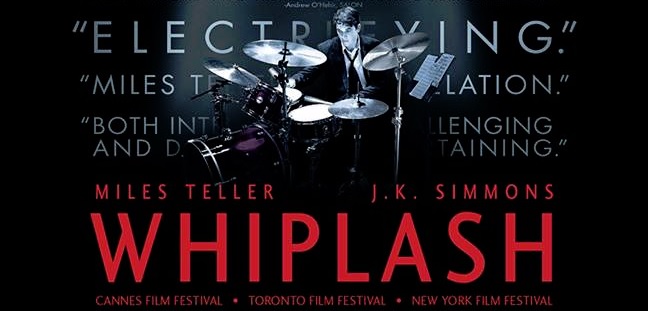Serious drama of a New York music school student drummer seeking greatness and his verbally abusive politically incorrect mentor who pushes him beyond his limits.
Hollywood is narcissistic and self-infatuated with the importance of artists and their art. From Sunset Boulevard to A Star is Born to Birdman, we are constantly exposed to the inner and outer turmoil of the artist obsessed with success, excellence, meaning and purpose. Hollywood portrays artistic “genius” as often “misunderstood” or “destroyed” by a morally traditional society (The Invisible Woman, Girl with a Pearl Earring, Surviving Picasso), or artists as “ahead of their time” and missed by a conventional world (Basquiat), or as suffering saviors (Bright Star, Vincent and Theo). There are now so many movies and TV series of the insane but beloved creative world of Hollywood, you could name a new genre “Hollyweird” (The Player, Barton Fink, The Big Picture, Tropic Thunder, Adaptation, Mulholland Drive, Entourage, Ed Wood etc.)
Look, I’m biased, because I’m one of those obsessive artists, so I find a lot in those stories that I resonate with. But there is much that I am also repulsed by, such as the self-destruction of many artists, or their rationalization of narcissism, decadence, and deviance.
 But let’s be honest, the heart and soul of the artist in many of these stories can be a powerful microcosm of the macrocosm of all our lives. The pursuit of beauty and excellence in art is a metaphor for the significance we are all seeking in different ways. Whether, nurse, lawyer, plumber, cop, writer, janitor, athlete, or housewife, many seek excellence in what they do because they know that doing it well results in something good. Everyone wants to be connected to something of significance.
But let’s be honest, the heart and soul of the artist in many of these stories can be a powerful microcosm of the macrocosm of all our lives. The pursuit of beauty and excellence in art is a metaphor for the significance we are all seeking in different ways. Whether, nurse, lawyer, plumber, cop, writer, janitor, athlete, or housewife, many seek excellence in what they do because they know that doing it well results in something good. Everyone wants to be connected to something of significance.
Beauty has a certain sense of meaning to it. It frees us from our self-delusions of rationalism and empiricism. Beauty points toward meaning that exists above or beyond our mundane scientific existence that only ends in death. (atheist naturalism and scientific materialism are philosophical cults of death). Beauty implies transcendence. Which is why so many artists, including Hollywood artists, worship beauty as a false idol substitute for the living God.
Whiplash is a thoughtful portrayal of an artist seeking beauty and excellence that reminds me of the double edged sword of the pursuit of great art.
Andrew is a freshman drumming student at a New York conservatory of music. He gets “discovered” by a mentor instructor, Fletcher (played with real heart and soul by J.K. Simmons), who leads the coveted jazz ensemble that wins all the competitions and leads to a hopeful future. The problem is, Fletcher is a verbally abusive, trash-talking, politically incorrect hammer on his students. He treats them sometimes so irrationally harsh, they have no idea how to change or be better because he seems arbitrary or impossible in his demands to match “his tempo.”
Fletcher is nice to Andrew for exactly one moment and then launches into an unending tirade of belittling because he sincerely believes that the only way to achieve greatness in music is to push people beyond their limits. His quintessential example repeated throughout the movie, is that jazz musician Charlie Parker only became great because Joe Jones threw a cymbal at his head when he first played poorly for him. Fletcher says, it was that which caused Charlie to go back and practice so hard that he became “the Bird” because of it.
The idea here is quite universal: greatness only comes out of those who never give up and endure beyond where everybody else gives up. This is not to say that everyone is capable of such greatness, but rather that the great ones will rise out of such adversity that discourages the “normal” or mediocre ones. So innate talent is not denied here. Rather, excellence is elevated over mediocrity, which is quite politically incorrect in our current egalitarian world that seeks to destroy quality and excellence in the name of equality, fairness, and “leveling the playing field.” If you do your job too well in many companies or life situations, you are actually hated and ostracized by the “normal,” the unions, the government and other worshippers of mediocrity and equality.
A particularly poignant scene occurs at the dinner table in Andrew’s home, where Andrew’s family and friends laud and praise his brother and friend for their minor league football achievements while barely noticing Andrew’s musical accomplishments of greater import. Why? Because their shallow lack of appreciation for what is really important.
I can tell you, that is one very real experience that many of us artists have indeed experienced in our families. Though, in truth, the snooty high-art bifurcation from popular arts is itself another kind of ignorant bigotry of the elite. After all, some of the greatest art really has been created by pop artists: musicians, filmmakers, and others. Charlie Parker was a Mozart of jazz, and jazz is not inferior to classical, any more than an indie or art-house film is necessarily more artistic or important than a studio blockbuster (unless its Michael Bay)
But here’s the thing: my buddy Joe Potter and I have had an ongoing conversation over decades about whether or not great artists (or great anything) can ever be truly good persons. It seems like so many great artists are complete A-holes, who abuse drugs, women, family, those who love them, and heck, humans in general. You cannot help but wonder if the pursuit of creative excellence is at odds with the pursuit of humanity and love. Though I believe there is a good theoretical argument for goodness and greatness rooted in a proper understanding of a good and great Creator, I have to admit that in the practical world, such lived-out theory is quite hard to find.
Are only alienated and selfish people of extremes capable of creating such artistic excellence or can a well-adjusted and happy stable person of balance create significant beauty? It seems that suffering is the crucible of character, depth and wisdom. But must abuse and meanness be the only catalyst to create that suffering? Perhaps so in our pampered world of ease and entitlement, where the only suffering many people experience is when their smart phones go dead.
Fletcher creates artificial suffering in order to call out the hidden Charlie Parkers that may exist somewhere in his mass of mediocrity. Because the truly great ones like Charlie would never give up against such setbacks. In fact, it spurs them on to work harder and be better. A lesson we should all learn in life.
The positive intent of Fletcher’s approach is expressed when he tells Andrew that “there are no two words in the English language that are more harmful than ‘good job.’” “Good enough” is the enemy of greatness. It stops you from reaching for your higher potential. Again, as an artist, I teared up at this scene because I have struggled with this very temptation to accept good enough over best.
 But here’s a push back: Is greatness the only thing of value when it comes to art? Is there not beauty in normality or harmony? Will the only movie that matters be the one that wins the Oscar? (of course not) Hasn’t greatness been overlooked by the elite just as often as the masses? At one point in the movie, the football frat boy asks Andrew if the music competitions he wins are kind of subjective, and Andrew answers no. But the movie does not indicate the fact that Andrew is in fact wrong. Though there is some element of objective skill that is certainly a part of the craft of any art, subjectivity in taste is just as certainly a part of it as well. After all, the Oscars themselves are determined by Hollywood politics and money, certainly not some objective standard of greatness. Sometimes “greatness” can become its own enemy.
But here’s a push back: Is greatness the only thing of value when it comes to art? Is there not beauty in normality or harmony? Will the only movie that matters be the one that wins the Oscar? (of course not) Hasn’t greatness been overlooked by the elite just as often as the masses? At one point in the movie, the football frat boy asks Andrew if the music competitions he wins are kind of subjective, and Andrew answers no. But the movie does not indicate the fact that Andrew is in fact wrong. Though there is some element of objective skill that is certainly a part of the craft of any art, subjectivity in taste is just as certainly a part of it as well. After all, the Oscars themselves are determined by Hollywood politics and money, certainly not some objective standard of greatness. Sometimes “greatness” can become its own enemy.
At what price great art?
The genetic connection of selfishness and greatness is another theme explored in the film, at the midpoint, where the protagonist fully commits to his course and there is no turning back. Andrew breaks off his new relationship with his love interest, Nicole. He explains to her that he wants to be one of the great drummers, which means he will spend more and more time at his drumming, which will take time from her, which will cause her to resent him, which will cause him to resent her for forcing him to take time away from his drumming. So they should just avoid the whole mess by breaking up now because he wants to be great. It’s quite simple and direct. And profoundly sad in the revelation of its narcissistic self-obsession. Later in the film, he experiences failure and seeks her comfort, but it is too late for this lover of greatness, because she is already in love with someone else.
But Andrew does have his moment of being pushed to greatness and that loss of love is quickly forgotten as insignificant, even necessary, as Andrew finally makes a psychic connection with his mentor, Fletcher, who appears to finally have found his Charlie Parker. But this “glory” of greatness leaves the viewer to wonder if the storytellers have failed to consider the ramifications of their own story. Rather than depicting the true damaging cost of sacrificing everything to the god of “greatness,” this film seems to be saying that in the end it’s worth it.
And that turns the beauty of excellence into ugliness.



One comment on “OSCAR WATCH • Whiplash: The Ugly Truth of “Great” Art.”
Hi, Brian. We’ve begun to discuss your review at Arts & Faith:
http://ArtsAndFaith.com/index.php?showtopic=29231&p=316150
Comments are closed.